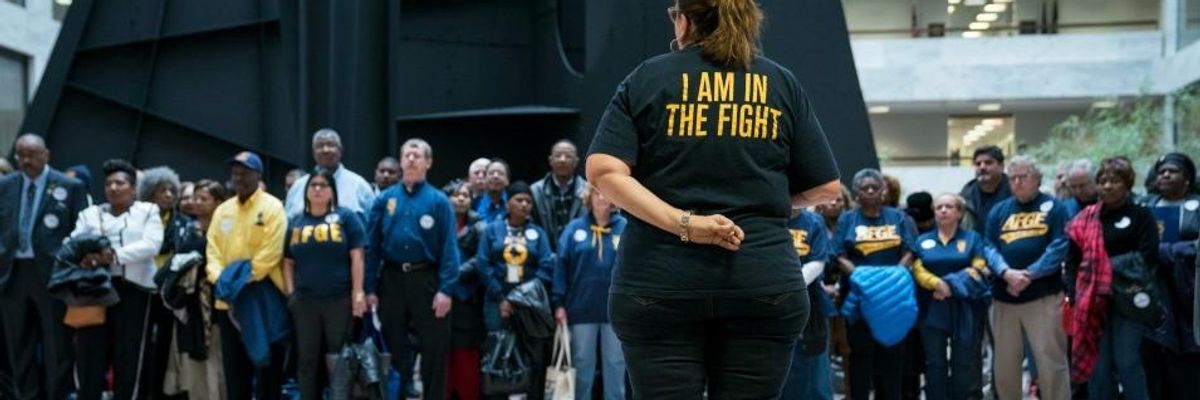The chairs of 23 House committee and subcommittee on Wednesday demanded information from dozens of federal agencies on the impacts of an executive order from President Donald Trump that critics warned could lead to a purge of career federal employees and let the outgoing administration "replace talent and acumen with fealty and self-dealing."
At issue is an Oct. 21 order in which the White House asserted a need for "an exception to the competitive hiring rules and examinations for career positions in the federal service of a confidential, policy-determining, policy-making, or policy-advocating character." The order created a new schedule of federal employees within the excepted service, Schedule F.
In their letter to 61 federal agencies, the Democratic lawmakers, led by House Oversight Committee chair Carolyn B. Maloney, asked for "a full accounting of any positions converted, or being considered for conversion, under the new Schedule F recently created though Executive Order 13957. The creation of this schedule would be a dramatic change in the composition of the civil service and expose it to undue political influence and intimidation."
Citing their "legislative and oversight authorities," the committee heads demanded by December 9--with biweekly updates through Inauguration Day--information including a list of positions that have been converted to Schedule F and a list of those "who held positions as political appointees since January 20, 2017, who are now employed in permanent competitive positions, nonpolitical excepted service positions, or career Senior Executive Service (SES) positions."
Tim Stretton, a policy analyst with the Project on Government Oversight (POGO), last month summed up Trump's order and its potential impacts, writing that it "is designed to give federal agencies more flexibility to quickly hire policy staff to meet their needs, and to quickly fire underperforming employees without having to show cause." Stretton continued:
It does this by essentially making them an at-will employee, eliminating the thorough hiring selection process and the protections that prevent agencies from firing personnel without cause. The new authority to quickly fire staff is particularly concerning because it essentially strips the employees of their civil service protections, including the ability to appeal adverse personnel actions. [...]
Under the president's new executive order, agency heads must review all positions in the competitive and excepted services and determine which positions would be categorized under the newly created Schedule F. Employees who are reclassified would not be able to appeal the decision. The administration could not release how many positions it estimates might be subject to the newly created schedule because it has left the reclassification up to the discretion of each individual agency head. It's worth noting that the executive order specifically states the senior executive service--which had just over 8,000 employees as of 2016--will not be affected. With only 8,000 employees exempted from reclassification, there could [be] hundreds of thousands of employees subject to this executive order.
Most concerning is that the new Schedule F could be used to target specific employees. Given that agency heads have nearly complete control over which positions get reclassified within their agency, an agency head could reclassify a specific position based on who currently holds it. Agency heads actually have an incentive to do this as they work at the pleasure of the president and in theory would make decisions that meant getting on the president's good side or that would mitigate the risk of being fired themselves.
The order also drew swift and sharp criticism from the American Federation of Government Employees (AFGE).
Everett Kelley, national president of the union, framed the order as "the most profound undermining of the civil service in our lifetimes."
"The president has doubled down on his effort to politicize and corrupt the professional service," Kelley said in a statement. "This executive order strips due process rights and protections from perhaps hundreds of thousands of federal employees and will enable political appointees and other officials to hire and fire these workers at will."
The lawmakers' letter was sent a day after a separate letter led by Rep. Gerry Connolly (D-Va.), chair of the House Subcommittee on Government Operations, and House Majority Leader Steny Hoyer (D-Md.), in which they urged the leaders of the House and Senate Appropriations Committees to block the executive order in the next spending bill.
"This executive order, which the Trump administration is rushing to implement without adequate analysis just weeks before the president leaves office, could precipitate an exodus from the federal government, leaving agencies without deep institutional knowledge, expertise, experience, and the ability to develop and implement long-term policy strategies," the 13 member of Congress wrote Tuesday.
"We ask that you join us in reversing this harmful executive order," they added.

